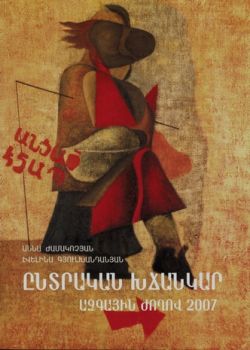Those assessments are versatile, mutually complementary, in several cases even mutually exclusive, since they express positions of different parts of the political system. The authors of the booklet also refer to public opinions and concerns related to political and electoral issues based on sociological researches conducted over the period 2006–2007.
The first part of the booklet presents issues typical for pre–electoral Armenia’s political system such as the dominancy of non formal rules in politics, the centralization of authority, the exclusion of opposition from political field, deideologization of politics, and a number of other issues, being themselves a threat for the accomplishment of electoral process.
In the second part the authors present public perceptions in pre–electoral period, the apathetic moods, the low level of credit towards the electoral institution, aloofness from state and political processes among society, the feeling of feebleness, and the atmosphere of fear towards external and internal threats.
The research also describes forms of separate activities of NGOs and their modest role in the 2007 National Assembly pre–electoral process, which was the result of their programs being tailored mainly by the logic of formal reality or due to the isolated work of each of them.
The forth part of the booklet includes viewpoints about the influence of external world on electoral process, stating the deepening dependence of Armenia from the West and the Russian Federation and at the same time affirming the failing interest of West towards Armenia and absence of concern about the lack of democracy.
And finally, the last part comes with the description of realities of the National Assembly 2007 elections, presenting the nature and form of participation of both state and oppositional political parties in the electoral process, the positioning of each of them in political system, their viewpoint of self–presentation, the issue of prevalence of electoral corruption, the issues of mutual perception and cooperation of opposite parties, as well as forecasts about possible electoral violations and the accomplishment of elective process.
The booklet aims to expand the knowledge of readers about the social and political processes in Armenia in 2007 and electoral institute. It is addressed to the wide audience of readers.
The book was published with the financial support of NED (National Endowment for Democracy), in the framework of “School of Democracy” project implemented by Armenian Committee of Helsinki Citizens’ Assembly.
Authors of the booklet:
Sociologists Anna Zhamakochyan and Evelina Gyulkhandanyan, alumni of Yerevan State University Faculty of Sociology, co-presidents of non-governmental organisation Socioscope, Armenia, as well as members of School of Democracy think-tank, Armenia.
Editor of the booklet:
Sona Manusyan, psychologist, co-president of non-governmental organisation Socioscope, Armenia, and a member of School of Democracy think-tank.
Documents:
- Electoral mosaics (in Armenian)
Download the booklet in the Armenian language
Book cover:



